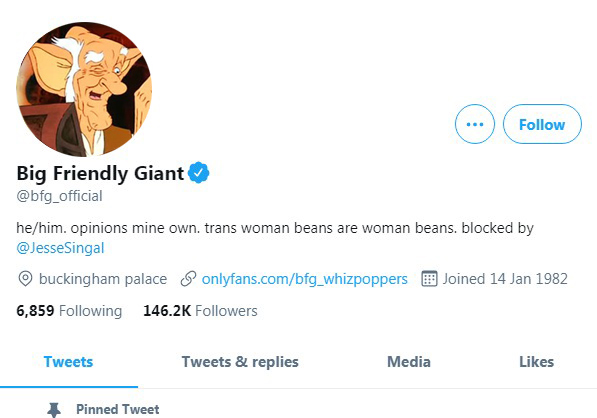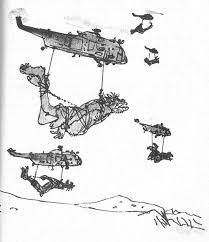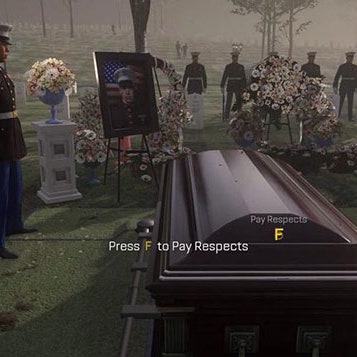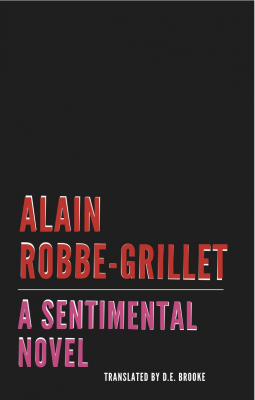The BFG is a masterly masterwork of masterism, sublime in every way. The prose glides like a lubed-up manatee sliding face-first into a woodchipper. The drama makes my heart race like a 3.9 gHz Ryzen 7 3800x overclocked to 4.0 gHz for faster frame-to-screen time. The plot clicks like a Kalahari Bushman’s tongue pronouncing the word “!Xóõ”. It’s as re-readable as an affidavit when you’re a lawyer billing $800 an hour and the jury has crippling amnesia.
Also, it’s the only book that caters to my fetish: elderly 24-foot-tall men farting on people.
For a few moments, the Big Friendly Giant stood quite still, and a look of absolute ecstasy began to spread over his long wrinkly face. Then suddenly the heavens opened and he let fly with a series of the loudest and rudest noises Sophie had ever heard in her life. They reverberated around the walls of the cave like thunder and the glass jars rattled on their shelves. But most astonishing of all, the force of the explosions actually lifted the enormous giant clear off his feet, like a rocket.
Sometimes I have this dream. The BFG is climbing through my bedroom window, bearing his horn. There’s a mischievous twinkle in his eye. You can’t tell anyone, the twinkle says. This is our little secret. I hear his stomach gurgling, and it merges with the blood thundering in my ears as he unbuttons his bum-flap, two feet from my face, and…
…I’m oversharing. Sorry. My therapist tells me that I overshare. But how can I not? There’s SO MUCH left to tell…
I hope the BFG doesn’t get cancelled, because he’s one of Roald Dahl’s most politically progressive characters. He’s a vegetarian. And a pacifist! He’s even an anti-capitalist (he turns down a lucrative zoo gig, because he knows the zoo industry is rife with exploitation).
Yes, he’s had problematic moments – he participates in human trafficking, is party to an imperialist invasion, and says that Greek people taste bad – but cut him a break. Nobody’s perfect, and he’s trying his best. When Trump was elected he would have been out marching in the street, wearing a pussyhat the size of a bumbershoot. He would have #FeltTheBern. He would have put a black square on his Instagram. He would have bullied a YA author to suicide.

I’m curious, why did the BFG become so sensitive, so unlike the other giants?
His height might play a role. As I’ve mentioned, he’s 24 feet tall. This is small for a giant – the others are described as being 50 feet tall – and this could have sculpted his aesthetic sense.
Most beautiful things in nature are small, and when you’re large you tend not to see them. For example, the 24-foot-tall BFG sees roses that are 4x smaller than our roses. The 50-foot Bloodbottler sees 8x smaller roses. They’d just be tiny specks of color, he’d have to squint to see the petals, and he certainly wouldn’t be able to smell their scent. It’s a sad life, and I rather feel for the Bloodbottler.
It makes you wonder how much we’re missing out on by being as big as we are. Sand is actually quite pretty under a microscope. Due to our size, we just see a gritty, coarse gray, all the colors blending together and cancelling out. But imagine being a 1 millimeter human, wandering through a sea of beautiful jewels. Perhaps there’s a diatom squirming between the grains. You could sling a leash around it, and have a diatom for a pet. Wouldn’t that be neat?
Topic shift: how much food do giants eat?
According to the BFG, giants devour a couple of humans every night.
‘That means,’ said Sophie, ‘that somewhere in the world, every single night, nine wretched people get carried away and eaten alive.’
‘More,’ said the BFG. ‘It is all depending, you see, on how big the human beans is. Japanese beans is very small, so a giant will need to gobble up about six Japanese before he is feeling full up. Others like the Norway people and the Yankee-Doodles is ever so much bigger and usually two or three of those makes a good tuck-in.’
Is this realistic? How many people would a 50 foot tall giant need to eat?
First, let’s make some assumptions.
- The average human is 6 feet tall and weighs 200 pounds
- The giants are humans scaled up by 8x but otherwise unchanged
A 6ft/200lb man has a basal metabolic rate of 2226, and eats 2,671 calories a day (if you’re curious, the 20% difference is caused by thermal inefficiency – your stomach doesn’t perfectly convert food into energy, which would break the second law of thermodynamics.) Klieber’s Law states that the metabolic rate of a endothermic homeotherm (such as a giant) scales as M^3/4, where M is mass. Also, remember that mass increases as a cube of length, so an 8x man would weigh 102,400lb (8^3*200), for a 512x increase in overall mass. 512^3/4 = 107.63, so the giants have a BMR of 239584.38 (2226 * 107.63), and need 287,501.256 calories per day (239584.38 * 1.2).
The human body contains 130,000 calories (according to someone on Quora whose sums I didn’t check), meaning the BFG’s estimate of 2-3 large humans per giant per night is…
…spot on. Either Roald Dahl guessed with surprising acccuracy, calculated it himself, or knows more details about the giant digestive tract than haunt my forbidden midnight fantasies.
However, there are some scientific issues with the book. An egregious example: 24-foot men can’t fly by farting. More interesting is the notion that humans taste different depending on where they come from.
‘But do these disgusting giants go to every single country in the world?’ Sophie asked.
‘All countries excepting Greece is getting visited some time or another,’ the BFG answered. ‘The country which a giant visits is depending on how he is feeling. If it is very warm weather and a giant is feeling as hot as a sizzlepan, he will probably go galloping far up to the frisby north to get himself an Esquimo or two to cool him down. A nice fat Esquimo to a giant is like a lovely ice-cream lolly to you.’
‘I’ll take your word for it,’ Sophie said.
‘And then again, if it is a frosty night and the giant is fridging with cold, he will probably point his nose towards the swultering hotlands to guzzle a few Hottentots to warm him up.’
‘How perfectly horrible,’ Sophie said.
‘Nothing hots a cold giant up like a hot Hottentot,’ the BFG said.
Clearly, the giants are falling prey to the placebo effect.
In Frédéric Brochet’s infamous 2001 wine study, wine tasters were unable to distinguish between red wine and white wine that had been dyed to look red. Suggestion is a powerful thing. Eskimos live in a cold place, so the BFG expects them to taste cold. Wales sounds like the word whales, so the BFG expects Welsh people to have a fishy taste. He’s not to blame. He’s a prisoner of the Sapir-Whorf hypothesis. I wonder if the snozzcumbers really do taste bad, or if the BFG has been primed to assume a bad taste because of their disgusting name.
Lastly, the giants are made of a weirdly light substance.
In Quentin Blake’s illustrations, we see captured giants being airlifted by the British RAF (this brutal and unprovoked attack on a sovereign country would later be condemned by the International Court of Justice, and played an important role in Margaret Thatcher’s Conservative Party being voted out in the 1990 election. They don’t show you that part in the book.)

From the shape, these helicopters appear to be the Westland Sea King, which has an unloaded weight of 6,387kg and a maximum takeoff weight of 9,707kg. So the giants, incredibly, weigh less than four metric tons, not the 46 tons I calculated above. It’s very odd.
Either that or the British RAF maintains a fleet of mega-sized Sea Kings, just in case such an event occurs. I’m going to bed. Perhaps I’ll have the dream again. I’ll keep you posted.
No Comments »
What’s the worst trend in gaming?
I don’t know. But the most inexplicable trend is the game that doesn’t want you to play it.
You are led by the nose down a path, having scripted experiences. Every choice has been made for you in advance. Stray from the path and you’re corralled back in by invisible walls or flashing “RETURN TO THE BATTLEFIELD” messages. Cutscenes are immensely long: you spend half the game with your inputs disabled.
Any “interactivity” is inconsequential: you can choose from two paths in the road, but both lead to the same destination. You can choose from two options in an NPC dialog tree, but the conversation ends the same way every time.
…Doesn’t this defeat the whole purpose of a videogame? Being able to explore and interact and express agency? Games lose a lot when they’re reduced to booklike narratives where the player’s “actions” are just fancy ways of turning the page.

This is not a “games were better in my day!” rant. The worst offenders in this category are actually classic games, particularly the adventure games of the 80s and 90s.
Remember adventure games? Like The Secret of Monkey Island and Leisure Suit Larry? Remember how, around 1995-1996, everyone suddenly stopped playing them?
“The death of adventure games” was a popular journalistic brief in the late 90s. Writers filed many a column inch about why adventure titles weren’t selling, and why the old guard of developers (Sierra/LucasArts/Trilobyte) were either shifting focus or filing for bankruptcy.
Always, an outside factor is blamed for killing the genre. Adventure gamers love Lost Cause myths where their beautiful, pure genre were ruined by Myst and Doom and Nintendo and arcades. Nobody wants to admit that the rot started within.
Here’s the truth: most adventure games (aside from a short list of classics) were actually total shit, full of illogical puzzles, mazes, pixel hunts, fetch quests, and arbitrary deaths. Here’s the average puzzle in a text adventure:
You are hungry! You find a HAM SANDWICH and a
TURKEY SANDWICH. What do you do?
>EAT HAM SANDWICH.
You are dead! It was a POISON HAM SANDWICH! Should have gone with the turkey, dumbfuck! Load save Y/N?
That’s not a strawman. Half the games Infocom ever made were exactly like that.
Just because I love you, here’s a real example from Westwood’s critically-acclaimed The Legend of Kyrandia, which sold quarter of a million copies in 1996.

Imagine this:
You are standing outside a house, looking down into a lake. You see a pair of eyes in the water. When you approach the water’s edge to get a better look, a huge monster rises from the water, snatches you with its tongue, and reels you into its mouth. Crunch.
Terrible. A whole Full Sail game design course could be taught about how utterly bad this puzzle is, in every conceivable way.
There’s no warning of danger, no possibility of escape, and the outcome for the player is death. There’s no skill involved: you just have to know not to follow the eyes. And since you can’t anticipate the next death trap (which there are a lot of), you end up creeping around Kyrandia like a scared mouse, hoping you don’t step on any Instant Death Pixels(tm).
The Legend of Kyrandia actively penalizes you for playing it. Exploring? Taking risks? That’s not in the plan. Stick to the main path, friendo, and do what the game wants you to do.
This design approach is great from the developer’s point of view. You spend less time designing art assets and playtesting puzzles. Your games ship sooner, and have fewer bugs. Open-world games with a lot of options quickly turn into a garden of forking paths. But in the long run, you get a constrained experience.
It’s interesting that the big genre shifts of the past few years have included open-world exploration games like Minecraft, and battle royales like Fortnite and Apex Legends. These are games where every experience is different. It’s not a surprise, in hindsight. Players, by definition, want to play. They don’t want to be conscripted characters in someone else’s story, and that’s exactly what many major games are.
I’ve long felt that the “are videogames art?” debate elides the obvious point that the “art” of videogames is usually just cinema, at best. Playing a Triple-A game is largely indistinguishable from watching a movie. The strongest claim games can make to being an art form are titles like Cosmology of Kyoto and Rez…
…obscure, nice products that nobody’s heard of.
No Comments »
“…putting Sade back on the bookshelf” is how Le Figaro describes this book. If anyone has A Sentimental Novel on their bookshelf, it’s with a fake cover, the spine turned inward, and probably an explosive self-destruct device fitted so the the book can be safely 451’d if the police come knocking.
Robbe-Grillet’s final work is short and lacks a narrative. It’s a sequence of pornographic vignettes, where nymphets of questionable legality are defiled by middle-aged male châtelains exactly like the author (don’t ask questions). This is the kind of book where you hear the word “nubile” and the author isn’t trying to be funny.
On one hand, I approve of books written by maniacs. On the other, the world has moved past the Marquis de Sade, and Robbe-Grillet just retreads familiar ground for the most part. It’s well-written (or flattered in translation), but to what end? Bataille, Huysman, and Comte de Lautréamont wrote far more imaginative and creative work a century ago, and they lived a century ago. Robbe-Grillet spent a lifetime championing le nouveau roman. Was he trying to champion le vieux romain, too?
A Sentimental Novel is hard to analyse. Airy and light. Floaty. There’s an intentional lack of substance to the book that makes it strangely affecting, but which also renders it averse to study. Barthes described Robbe-Grillet’s style as “a theory of pure surface” (or I think he does – I can’t find a source for this quote), and that’s very evident: A Sentimental Novel is a neverending plain of surfaces, with your eye forever bouncing off them. The prose displays everything, but displays nothing. We get descriptions of reflections glissading across a set of shears as they snip away a nipple. Whose shears? Whose nipple? Why? It’s all heat. No light.
In this sense, at least, Robbe-Grillet leaves his inspiration behind. Donatien Alphonse François’s books were always clearly about something: they’re notoriously full of political and philosophical rants (to the point where they’re turgid and boring). But a critic will have to dig very deep to find meaning in A Sentimental Novel, and any interpretation is probably 90% critic, 10% book.
I’m personally not impressed by writers that word-vomit imagery and burden the reader with the task of “interpreting” it. It’s not that the author is lazy (effort doesn’t matter in art. It’s not weightlifting). It’s that if the meaning is all coming from my own mind, why do I need Alain Robbe-Grillet in the picture? I enjoy thinking about books, and analyzing them, but I’d ask that the author at least meet me halfway by taking responsibility for the things on the page. A Sentimental Novel could be a Sade written by a computer. There’s no crests, no rises and falls, no build-ups, nothing.
I’m sure that if I stare at A Sentimental Novel for long enough, I’ll discover its genius. I’m also sure that if I stare at a piece of toast long enough I’ll see Jesus’s face.
Does transgressive literature have a future at all? Maybe it’s in the too-gay-to-function Dennis Cooper, the computer-mangled sentences of Kenji Siratori, the alt-lit of the web, the heart-freezing paralysis of Michel Houellebecq. Writers who are doing something new, however incompetently.
Even average writers like Palahniuk and Ellis are able to find new angles to exploit, such as capitalism, mass media, and so on. They’re not just rewriting Sade for the millionth time. Meanwhile, here’s Robbes-Grillet toiling alone in an abandoned mine, seeking gold in a shaft that was mined out a century ago.
No Comments »







